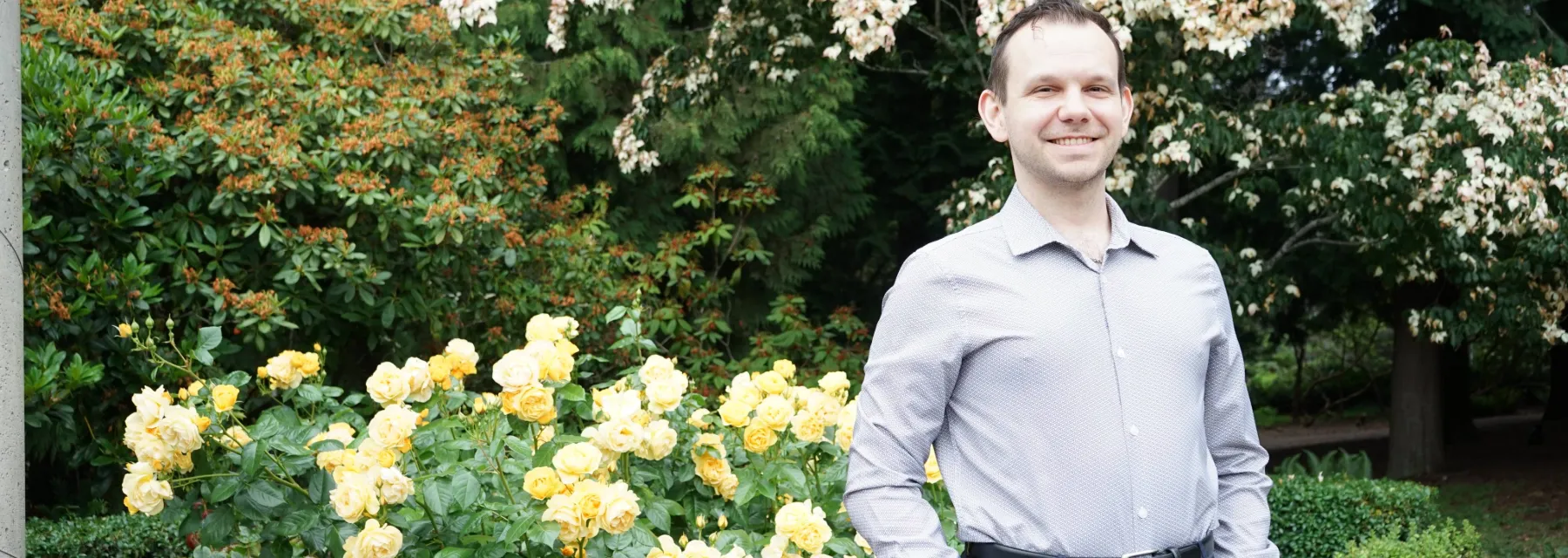
Tim Christilaw
MDS Computational Linguistics, Class of 2025
Tim Christilaw was feeling burnt out while work as a speech-language pathologist and was seeking a change of pace.
“As a linguistics expert of sorts, I wanted to take my existing expertise and apply it in a more ‘big picture’ kind of way; data science felt like a perfect fit because it allows me to apply language science to large-scale problems and their solutions,” Christilaw explained. He added that UBC’s Master of Data Science (MDS) in Computational Linguistics program was key to help him bridge that gap.
If a program like the MDS Computational Linguistics program didn’t exist, Christilaw said he would have pursued a bachelor’s in computer science. “However, the MDS Computational Linguistics program was an attractive option because it leveraged my linguistics background and offered an accelerated 10-month format.”
As well, being able to learn computational linguistics in-person on the UBC Vancouver campus was attractive versus doing an online program.
“Doing a program all online is convenient, but it would lead to a far less cohesive feel, less engagement with our learning, and less of a community being formed with the peer group. One of the greatest strengths of the MDS Computational Linguistics program is the bonding that happens with the rest of the cohort, and with the staff too!” Christilaw said.
One of the Christilaw’s favourite courses during the MDS Computational Linguistics program were Advanced Computational Semantics (COLX 563) and Sentiment Analysis (COLX 565).
“These courses gave us a great opportunity to learn the fundamentals of LLMs, both from a conceptual and applied standpoint, and included awesome hands-on experience in the form of interesting projects where we built functional large language model (LLM) pipelines,” he explained.
Speaking of LLMs, Christilaw was happy to see the program incorporate these tools into the curriculum.
“We are given opportunities to learn about how LLM and transformer technologies work from both a conceptual and applied lens which is really cool. For many of us - myself included - this knowledge very much came into play when we started our capstone projects! Because of the way the courses were structured, I felt confident using these tools in a real-life setting when my capstone started,” he added.
In terms of the capstone, that component was one of the reasons why Christilaw applied to the MDS Computational Linguistics program.
“We had full independence to approach the capstone partner’s project in the way that we saw fit. It was a really cool experience that taught us all to think outside the box and use the toolbox of skills we had spent the last ten months working towards,” he added.
One of the most important things that Christilaw got out of the capstone project was not only gaining valuable technical experience but also learning a lot of communication and soft skills like being able to communicate complex concepts to a non-technical audience.
Another perk of the MDS Computational Linguistics program was Christilaw’s ability to network with industry contacts through the variety of workshops and talks the program hosted and highly recommends future students attend.
“We’ve had plenty of opportunities to develop real-world professional skills - mock interviews, workshops, and communication/presentation skills. These are all huge for anyone looking to take their skills and work in industry,” he added.
As Christilaw enters the workforce, he is interested in roles that will bring automation and NLP tools to public health industries.
“As a former clinician I know that many of our technologies and systems have gaps in their functioning which can create more work for practitioners. I want to use my new skillset to streamline the lives of clinicians everywhere, where automation can contribute to improving their at-work performance, free time, and wellness,” he explained.
Tim’s Top 3 Tips on Succeeding in the MDS Computational Linguistics Program:
- Have patience with yourself: Early on, the learning curve may prove to be pretty insane, especially if you don’t come from a tech background. You might find that some of the early labs lead to you tearing your hair out - but be patient! In just a few short months you’ll look back on those days and realize how easy it all is to you now - and then it’ll feel great to think about how far you’ve come!
- Say ‘yes.’: Seriously - the program is offering a workshop? Say yes! There’s a networking event? Say yes! A professor wants someone to help annotate some data outside of class time? Say yes! The more you deliberately take advantage of opportunities on offer, the more you’ll feel like you really got your ‘bang for your buck’ out of this program.
- Manage stress: This one is pretty straightforward: the program is wildly intense, so do what you need to do to keep from going nuts! It’s okay to take a night off, to reach out to faculty when you’re struggling, or to ask for an extension or two. We are all human!
